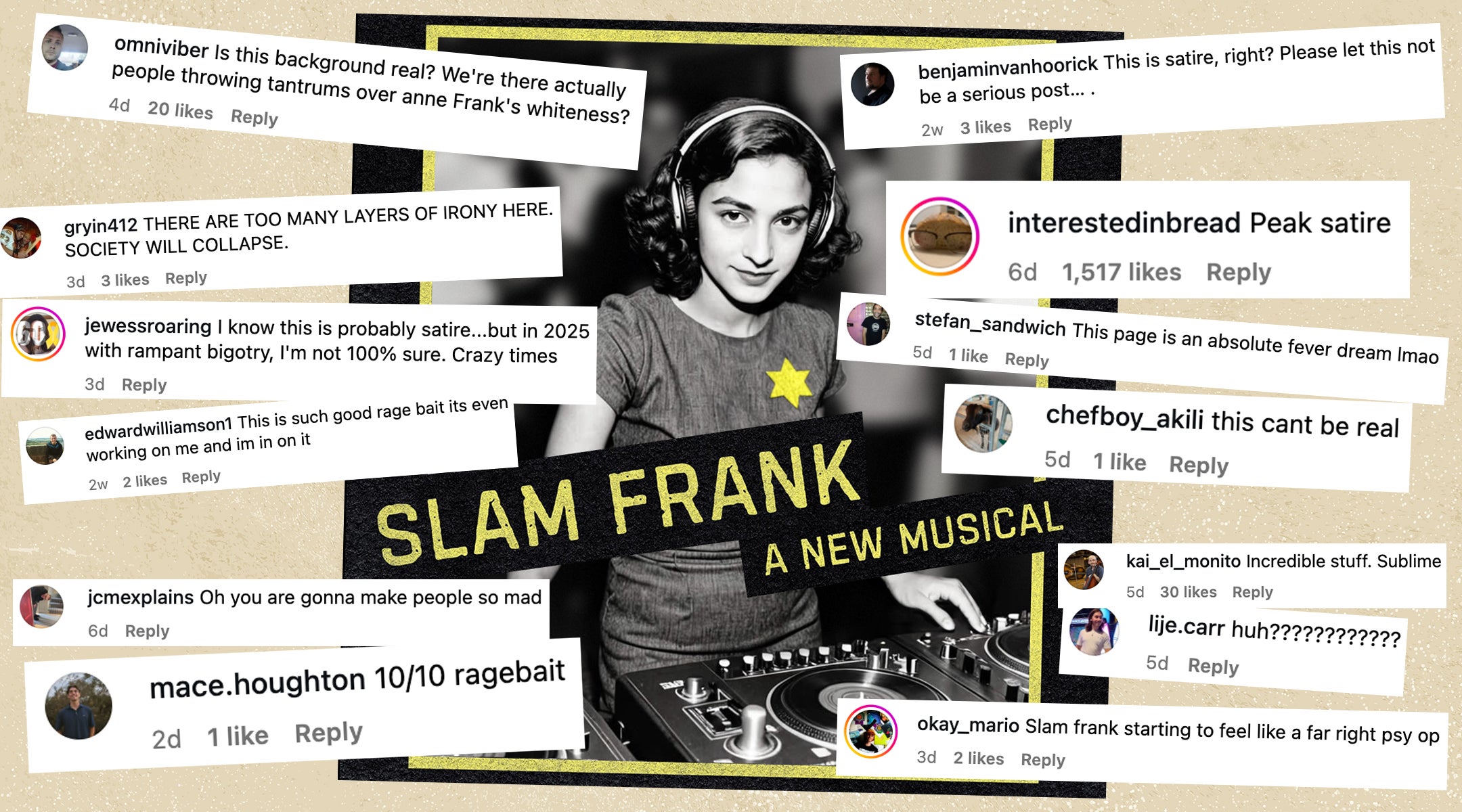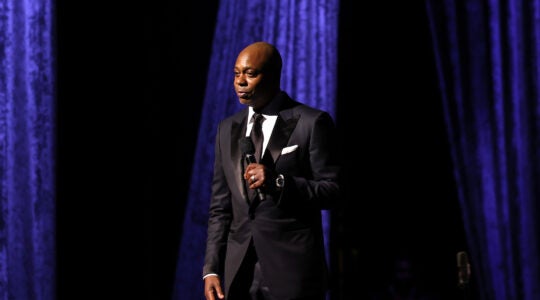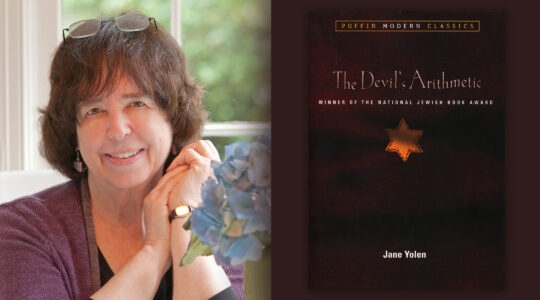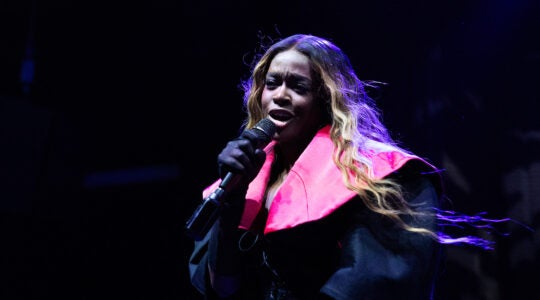What exactly is “Slam Frank,” the purported hip-hop musical that reimagines the Holocaust’s most famous victim as a pansexual Latinx girl today?
Is it a real show with real actors and real songs constructing a real story for real audiences? Or is it an elaborate social media prank designed to pillory the left and rage-bait the right? Or could it be both?
The show’s Instagram account, its primary engine of promotion, has stoked the confusion.
Co-creator Andrew Fox posts snippets of songs, rapping in character as Anne Frank — or Anita Franco, as she’s named in the play — about being “straight from the barrio” and calling people “gringos.”
“Storytellers like me are trying to make the Holocaust diverse,” Fox said in one Instagram post. “Because you watch movie after movie after movie and everybody looks like this — white, white, white,” he remarked, pointing to a still from “Schindler’s List.”
The posts range from sneak peeks of the show to broader, seemingly tongue-in-cheek commentary. Fox, who is Jewish, frequently posts on the account about being a Latinx artist (through his father’s Ecuadorian third wife) and his efforts to “decolonize Broadway.” Another post satirizing inclusivity issues decries the fatphobia of both Broadway theaters and Nazi concentration camps. (“Neither of these environments were built to accommodate people of size.”)
Fox and the “Slam Frank” team have built a social media campaign that is, like the premise of the show itself, inclusive to a fault. Many don’t know what to make of it, or whether this build-up is leading toward a real production.
“You guys are joking right?” one Instagram user commented. “I genuinely can’t tell in this political landscape.”
“You can’t actually think that making this is a good idea,” another user pleaded in a DM.
Among the at-least dozens, and often hundreds of comments on each “Slam Frank” post, you can be sure to find commenters asking something along the lines of, Is this real??
But lately, as the show has opened workshops to critics and sold out the first eight nights of its upcoming Off-Broadway run, its devoted but somewhat befuddled fan base has started to trust that there might really be a full performance ahead — one that bears out its billing as “The Diary of Anne Frank” meets “Hamilton” meets “South Park.”

Anne Frank’s diary has been adapted for film, television, opera, Broadway and as a graphic novel, but never as a sendup of the discourse around inclusivity. Above, the cast from the 1958 film adaptation, “The Diary of Anne Frank.” (20th Century Fox)
“It’s a real musical,” Fox said in a recent phone interview. “I think that once the website went up, and then the tickets went up for sale, and then we actually had the concert [in June], everybody kind of went, ‘Oh, we get it now.’”
Anne Frank’s diary has been adapted for film, television, opera, Broadway and as a graphic novel, but never as a sendup of the discourse around inclusivity. Inspiration for the play came from what Fox and co-creator Joel Sinensky, who is also Jewish, were seeing online a few years ago. An earnest social media discourse in 2022 — which followed a similar one from the previous year — asked whether Anne Frank, despite having been murdered by the Nazis, benefited from “white privilege.” The debate that followed focused on whether identity politics had gone too far. That discourse also served the argument, discussed in works like David Baddiel’s “Jews Don’t Count,” that today’s progressive identity politics care less about antisemitism than about other forms of discrimination.
Around the same time the Anne Frank debates went viral, Fox said, he was also noticing “all these instances where identity politics issues, and theater representation issues, would twist back on themselves and bend and morph.
“And I just kept going, ‘There’s something interesting here,’” Fox said. “And if I take this logic — ‘Well, you have to make people more marginalized! There’s a marginalization hierarchy!’ — if I take it to its extreme, it starts to break. And I want to see it break so I can understand it better.”
Is Fox an anti-woke conservative? Or a liberal who thinks progressives hurt themselves by going too far? He says he’s keeping his own politics private, and doesn’t like when playwrights and writers “come out of the closet politically, in any direction.”
“Once people know which direction you’re coming from, they can decide whether to dismiss you or not,” Fox said.
Like “South Park,” which before its recent anti-MAGA turn enjoyed skewering liberal pieties, Fox and Sinensky are running with the idea of being so inclusive that it becomes offensive — like, for example, when they posted on Instagram that they “intend to maintain fully segregated mezzanine access to ensure safety of BIPOC,” the popular acronym for Black, Indigenous, and People of Color.
The pair have built out a cast of characters based on the real-life Jews who hid in the Secret Annex in Nazi-occupied Amsterdam. That includes the pansexual Latinx Anita Franco, Peter van Daan as a non-binary dancer and Mister van Daan, the play’s only cisgender heterosexual male, who is described as “literally worse than the Nazis.”
The show is framed as an ultra-progressive regional theater company staging an adaptation of Anne Frank’s diary. According to YouTube theater critic Matthew Hardy, who caught the concert reading in June, the show starts off with “a hilarious monologue from the straight white producer/director” of the theater group, who is “earnestly explaining” the concept of his show — a diverse, race-swapped version of Anne Frank’s Holocaust story — as if “it’s the most progressive thing ever.”
Then, the play-within-a-play ensues, encapsulating the show’s story that Hardy calls “hilarious,” “aggressive” and “subversive.”
“It’s not trying to give you a warm, clear moral,” Hardy says. “Instead, it really undercuts every resolution — you think you’re about to learn something, or have a cathartic moment, and then bam. The song flips and you’re in a darker place.”
Fox has worked as an orchestrator, composer and musical producer for a number of shows and musicians; before “Slam Frank,” he most recently wrote the music for “The Last Magic Negro,” a short satirical musical about the “magic Negro” movie trope (a wise, perhaps mystical character whose only purpose is to help the white protagonist). He’s also published a series of Stephen Sondheim songs adapted to various musical styles, and a viral cover of Vanessa Carlton’s “A Thousand Miles” set to the chord progression of jazz standard “Giant Steps.”
Fox, who grew up Jewish in Los Angeles before moving to New York in 2005, calls himself a “pretty secular” Jew. His grandfather was the ritual director for a Conservative synagogue in L.A. for 60 years. Fox said he grew up going to synagogue for the High Holidays and had a bar mitzvah, but his relationship with Judaism has been “complicated.” (He also shared that he was kicked out of Hebrew school as a kid.)
Sinensky is Jewish, as well — and in Fox’s words, is “the most secular a Jew can get.”
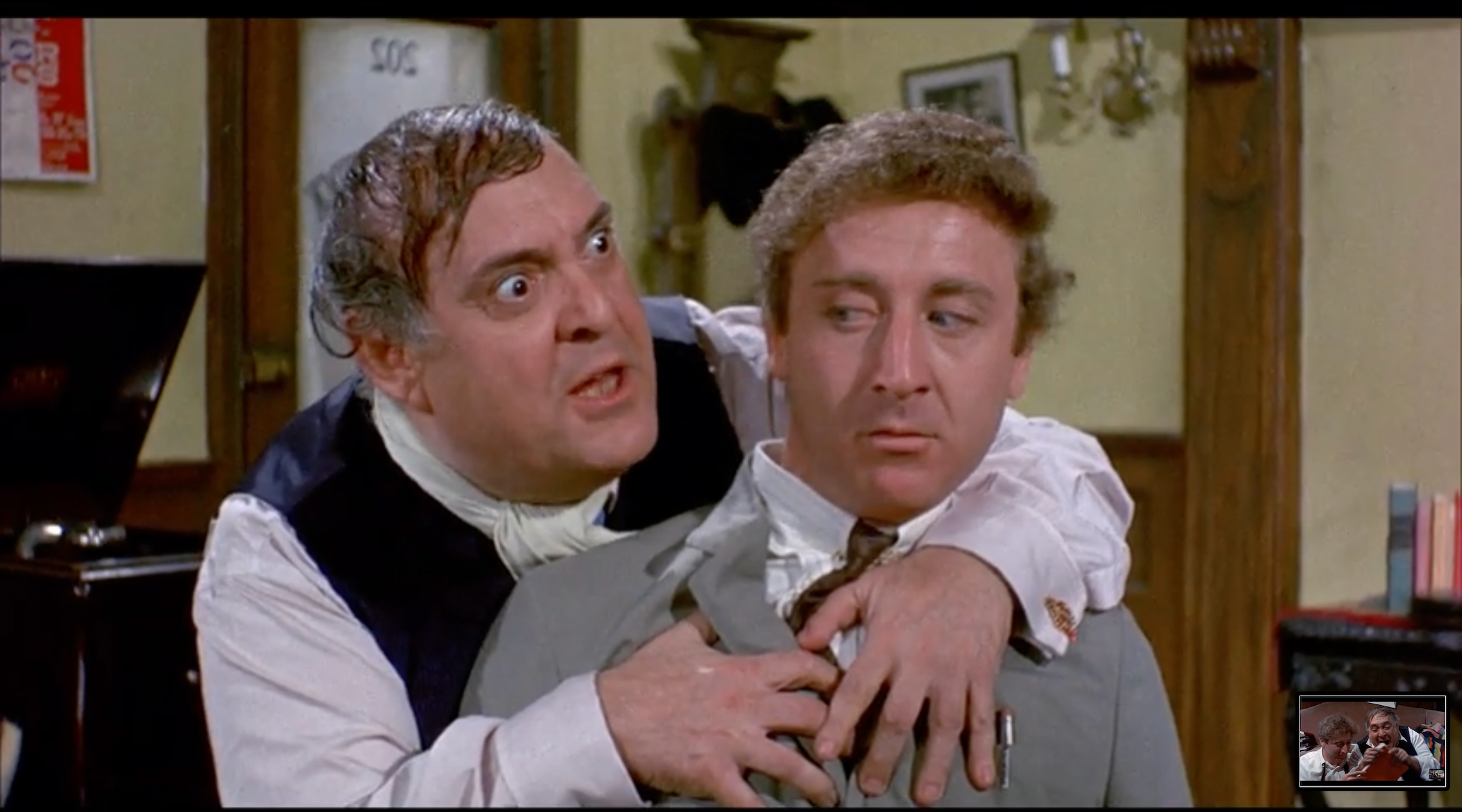
“The Producers,” the 1967 film by Mel Brooks starring Zero Mostel, left, and Gene Wilder, shocked audiences by placing buffoonish Nazis at the center of a black comedy about show business. (Embassy Pictures)
Assuming it is real, “Slam Frank” is set to join a lineage of provocative Jewish-written comedies — headlined by Mel Brooks’ “The Producers” — that tested taboos around the Holocaust, including the 1993 British comedy “Genghis Cohn” and Taika Waititi’s 2019 dramedy, “Jojo Rabbit.”
Avinoam Patt, who co-edited the book “Laughter After: Humor and the Holocaust,” said that “Slam Frank,” from the looks of it, differs from works like “The Producers”: While Brooks set out to mock Hitler and his followers, Fox and Sinensky’s play is “using the backdrop of the Holocaust to raise and amplify the satire that they’re trying to make.”
With the backdrop of the Holocaust comes controversy, especially if “there’s a feeling that it sort of trivializes the memory of the Holocaust,” said Patt, who teaches a Jewish humor class at New York University. “If you situate a joke against the backdrop or the context of the Holocaust, it ups the ante. It raises the level of tension and the stakes.”
That the play comedically deals with the story of Anne Frank, in particular, raises the ante even more, said Patt. Comedic treatments of Anne Frank have been done before, he pointed out — “Family Guy” has cutaway jokes about the young diarist and Jewish comedian Jeff Ross hosted a “roast” of Anne Frank on Netflix, to name two examples.
But at a time of rising antisemitism, and with accusations that Jews are “weaponizing” the Holocaust to defend Israel’s actions in Gaza, are people losing their tolerance for Anne Frank humor?
Fox said he’s received death threats, as well as threats of people protesting at the show. But, he pointed out, “There has already been massive political and artistic, and discursive co-opting of Anne Frank, in every direction.”
“So if you’re the type of person who will post a picture of Anne Frank for your own political cause — ‘Anne Frank would be for the earned income tax credit,’ or whatever — and I start playing with that, then you get bothered?” he said. “That’s a you thing.”
Performances of “Slam Frank” begin Sept. 17 at Asylum NYC (123 E 24th St.). The upcoming dates are part of a developmental run, meaning the script is still being tweaked for later performances.
JTA has documented Jewish history in real-time for over a century. Keep our journalism strong by joining us in supporting independent, award-winning reporting.
